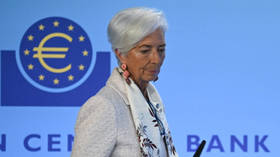ECB hikes interest rates to multi-year highs

The European Central Bank (ECB) raised interest rates for the ninth consecutive time on Thursday, indicating further tightening amid stubbornly high inflation and a growing risk of recession in the euro zone.
The latest rate increase of a quarter percentage point brings the ECB’s main rate to 3.75%, its highest level since a similar level set in 2000. The main refinancing rate was set at 4.25%.
“Inflation continues to decline but is still expected to remain too high for too long,” the central bank stated. “Future decisions will ensure that the key ECB interest rates will be set at sufficiently restrictive levels for as long as necessary to achieve a timely return of inflation to the 2% medium-term target.”
The Eurozone has been facing stubborn price growth lately. Although headline consumer price growth in the 20 countries that share the euro has halved since its 10.6% peak in October 2022, economists have widely expected further rate hikes. The rate declined to 5.5% in June from 6.1% in May, but is still far above the ECB’s target of 2%.
ECB President Christine Lagarde told a press conference on Thursday that her team was “open-minded” about upcoming decisions.
The central bank might hike or hold rates steady in September, but they “are not going to cut,” she said.
Eurozone business activity data released earlier this week indicated declines in the region’s largest economies, Germany and France. The figures increased the chances of a recession in the single currency area this year, according to analysts at ING Germany.
For more stories on economy & finance visit RT's business section












